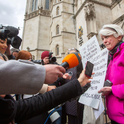Time magazine and the Financial Times have both named Donald Trump their person of the year, but a better option might have been Gisèle Pelicot. This is the woman who, having discovered that her husband, 72-year-old Dominique Pelicot, had for almost a decade drugged and invited strange men he met online to rape her, insisted on the mass rape trial being held out in the open.
Gisèle waived her anonymity so that people would see the crimes, so that other victims would see that they have no reason to feel ashamed, “so that shame changes sides”. She sat through hours of testimony, watching the videos Dominique made of her abuse (and which he kept on his computer in files with names such as “abuse”). Before the trial started in September, Gisèle had never laid eyes on many of the defendants accused of abusing her while she was unconscious.
Gisèle, also 72, only discovered her ex-husband’s crimes in 2020, after he was caught upskirting in a supermarket. The police then uncovered the files on his computer, giving her an answer to the mystery of her frequent memory lapses and multiple sexually transmitted infections. Fifty men were on trial alongside Dominique, and most denied the charges of rape. Given that the French legal system requires proof of intent, rather than consent, some defendants argued that it was not their intention to rape her, or even that they thought she knew what was happening. Dozens of other men were seen in the footage of the abuse, too, but were never traced.
On Thursday 19th December, 47 of the defendants were found guilty of rape, two of attempted rape and a further two of sexual assault. Dominique Pelicot was sentenced to 20 years, the maximum sentence under French law, the others to between three and 15 years. Pelicot was also found guilty of drugging his daughter when she was 20, of taking pictures of her in lingerie when she was asleep. These images were found on his computer, but he denied the charge. Some people, including the Pelicots’ children, have said the sentences are too light.
For weeks at the courthouse in Avignon, a community grew around Gisèle Pelicot—journalists, activists, people who wanted to support her, other victims of abuse. Sitting through the trial of these men who had raped her, Gisèle became a feminist icon, a symbol for abuse victims. The FT included her on another list, of the 25 most influential women of 2024, and the BBC named as one of the 100 women of the year. On social media, politicians from around the world praised her courage. “What dignity”, wrote Spain’s Prime Minister Pedro Sanchez.
Outside the courthouse on Thursday, Gisèle addressed the gathered crowds, a picture of perfectly channelled, quiet fury. “When I opened the doors to this trial on 2nd September, I wanted society to be able to take part in this debate. I have never regretted that decision,” she said.
Dominique Pelicot’s crimes are monstrous and the case is one of such unspeakable horror that it’s difficult to believe it actually took place. Among the accused was Jean-Pierre Marechal, 63, who didn’t rape Gisèle, but did drug and rape his own wife over a five-year period, seemingly inspired by Dominique, whom he invited to take part. Dominique Pelicot was also found guilty of the aggravated rape of Marechal’s wife.
Mostly Pelicot’s co-accused are so ordinary. In France, the media called them “Mr Every Man”. Most lived within 30 miles of the Pelicots’ village, Mazan, where much of the abuse took place. Among them are a journalist, a supermarket worker, an electrician, an ambulance driver. One, a father of six, lived next door to the Pelicots. Many are married, are fathers. One man reportedly went to the Pelicots’ house on the night that his daughter was born. They are now in their 30s, 40s, 50s, 60s, 70s. Some were also found to have child abuse imagery. They can’t all be monsters, though what they did was monstrous.
In bearing witness to her own abuse, partly in the name of other victims, Gisèle herself has been justifiably lionised, transforming from an “anonymous grandmother”, as some headlines put it, to a figurehead for victims. Outside the courthouse on Thursday, she said she was thinking “of the many victims who are not recognised, whose stories often remain in the shadows.” She wanted them “to know that we share the same battle.”
What Gisèle Pelicot has done takes astonishing bravery, but courage should not be a requirement for justice, nor for “shame to change sides”. Still, with hers Pelicot has gifted others with hope for real change, for real action, finally, against banal monstrosity, against the ubiquitous violence inflicted by such ordinary men.














